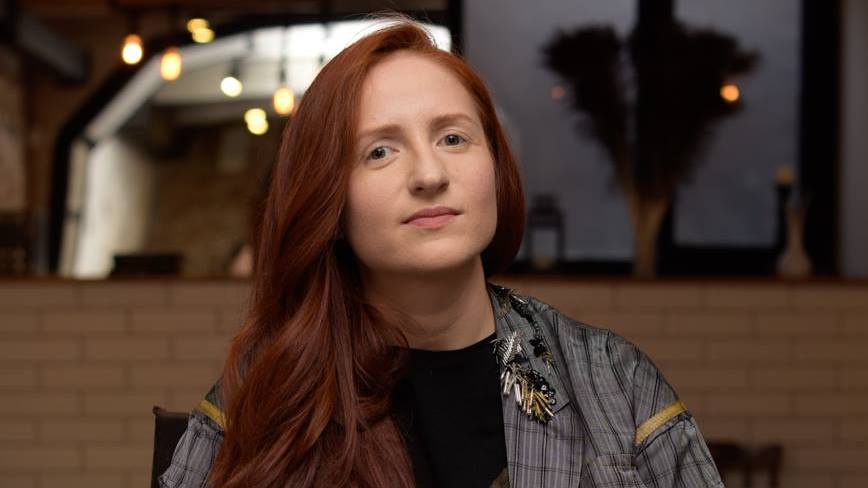
The Sea Tomorrow directed by Katerina Suvorova is already available on Netflix Europe.
Sea Tomorrow is the debut feature film directed by Kazakh director Katerina Suvorova. The film tells about the disappearance of the Aral Sea and, first of all, about people now living on the shores of a dried-up sea.
"A fisherman who has nothing to catch. A gardener who grows trees in the salt desert. A hydrobiologist studying the bottom of a dried-up sea. Pirates living on the wrecked ships, scrapping them for metal. All of them have found a job, purpose and life in a world where the worst already happened. The sea is gone. Maybe someday it will return," says the synopsis.
The world premiere of the film was held in 2016 at the Locarno Festival. In the same year, the film won the prize of the Guild of Film Critics of Kazakhstan "For Contribution to the Development of Cinematography". A year later, Sea Tomorrow was nominated as the Best Film at the Tulpar Film Award. In addition to domestic awards, Suvorova's film was praised abroad. In 2017, it won the Anthropology and Sustainable Development Award at the Jean Rouch International Festival in Paris. The film was also bought by several international TV channels. And now it has become available on the world's largest streaming platform Netflix.
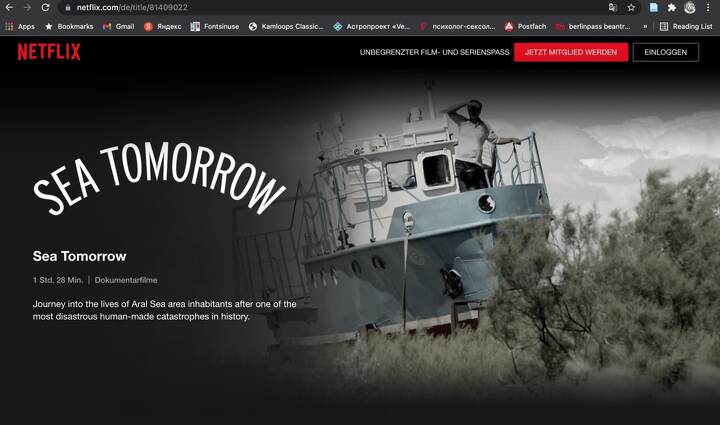
We talked to Katerina about her success.
F: Katerina, when did learn that Sea Tomorrow is the first Kazakh film released on Netflix?
"We knew that the contract with Netflix was signed back in March 2021." Since then, I had been searching daily for "Kazakhstan Netflix" or "Netflix Kazakhstan" on the internet, but I had not seen any results. And when our film was released on this platform, literally in the last week of October, it immediately came up in the results. This is why I think this is the first Kazakh film on this streaming platform.
F: How did Netflix get interested in your movie?
"I didn't make the movie specifically for Netflix, I was just making my first feature-length documentary. I was burning with the idea of creating it. I came up with it back in my first trip to the Aral Sea in 2010. Then I went on an expedition with my photographer friend, and I was very impressed. It was then that I got hooked on the idea to dismantle the stereotypes that the Aral Sea is a lifeless place, because it is absolutely not true. People live there, they work and they love their small homeland.
And the idea of the film was precisely to tell not about an environmental disaster as such, but about the lives of people in the aftermath of this disaster.
I made a film, and then something happened that I personally consider proof that a high-quality original creative product may well occupy a niche in the world of the global film industry. And the release of the movie on Netflix is just a kind of logical final step.
F: Film production is a rather expensive process. Where did you get your funding from?
"When I was starting the project, I already knew that I could not fund it myself." And the first thing that gave an impetus to my project was the statement of film critic Gulnar Abikeeva at one of the international film venues. When she found out about my idea and saw the potential in it, she nominated me for a film grant. I went to a competition I didn't even know about.
Before the trip, I went to Aralsk several more times, found the characters, formed a strong industrial project package for the movie and presented it at the competition. They liked my idea, and I received 64 thousand euros from the Robert Bosch Foundation (Germany).
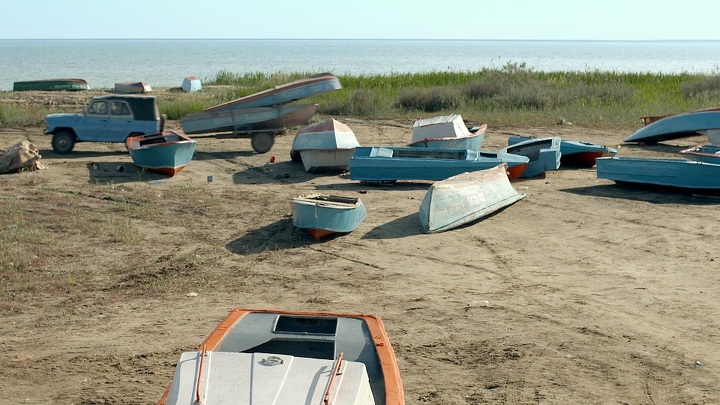
F: Was that enough for production?
– No, but that's not the most important thing. My main task was to get funding from Kazakhstan, because if movie was funded by German grant, then the origin country would also be considered Germany. And it was fundamentally important for me that it be Kazakhstan.
I started looking for sponsors, applied to Kazakhfilm for support, but was refused everywhere. And then I turned to independent producer Sain Gabdullin. He appreciated my idea, and together we started looking for funding. As a result, we came to Shyngys Kulzhanov (Ranked 33rd in the 2016 ratingof the richest businessmen of Kazakhstan according to Forbes Kazakhstan). He became a co-investor. So the film turned out to be Kazakh-German production.
In total, about 120 thousand dollars were pledged for the production of this film. With this money, we were able to afford many expeditions to Aralsk, buy high-quality equipment, assemble a creative team and eventually film a movie.
F: How did it happen that the film was first premiered not in the CIS countries, but in Locarno (Switzerland)? Was it easy to participate in this festival right away?
"I was an unknown emerging director from Kazakhstan, nothing was easy for me!" The only thing I had was the movie. In Kazakhstan, I still did not understand where to go or to whom. Then I just made a list of all the major festivals that are interested in documentaries. As a result, we applied for the largest film festival in Locarno. Our film premiered there.
We initially wanted to go to big festivals, because we knew that we would be easily accepted to less famous and smaller ones, such as in Bishkek or Jurmala Festivals. Therefore, we set the bar high and got accepted.
As soon as the film was released on the festival's website, my mail just crashed with offers to promote the film. In Locarno we had meeting after meeting, where we chose our partner.
After Locarno, a serious organization began working on the film under the leadership of Alexander Govedarik, a young sale agent who was then interested only in documentaries. I started to constantly receive invitations and tickets to festivals and I flew around the world to present the film.
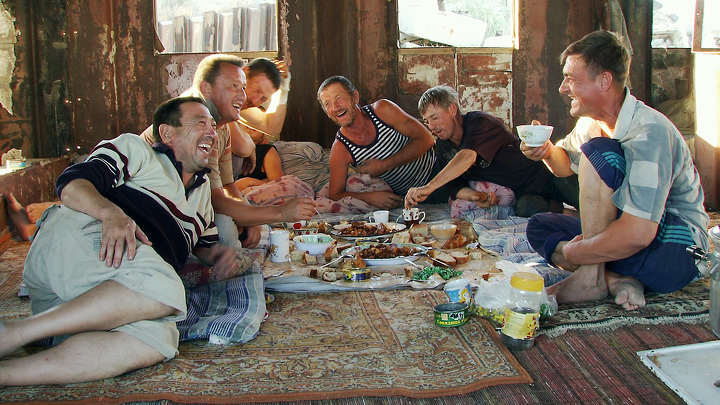
F: So Alexander Govedarik took over all the further promotion?
"Yes, he is one of the top sale agents in the international documentary market. I continue to make my new films in Almaty, while he travels around the world and promotes our work. Not only mine, of course. He submitted 12 films to Netflix for consideration, including our picture.
I couldn't do that kind of work myself–writing to Netflix. Can you imagine how many filmmakers write to them every day?!
My film got into the Netflix Europe slot precisely because European market participants work with it. And the selectors listen to the sale agents. They consider the festival logo as a sign that someone respected with a good education and cultural background has already evaluated the film and approved it.
F: The contract with Netflix was signed back in March, but why will it be announced only in October?
"When in March our sales agent wrote congratulations to us saying that we were accepted by Netflix, he also said that we could not publish this news until the film was available for viewing. For that, it has to be translated into European languages, since it will be released for European audience.
The film has now been translated into eight languages. Translation is a very thorough painstaking work. I remember, a translator from Portugal once wrote to me with a request to help me understand the intricacies of our language.
F: Why is Sea Tomorrow available for viewing on Netflix only for European audience? Will it be available for viewing to residents of the CIS?
"Since European viewers are interested, there is a demand. The program directors of each region have an understanding of what is interesting to the local audience, what will perform well. Therefore, I conclude that programmers in the CIS countries do not have such confidence that the film will be appreciated here. This is the result of the fact that the post-Soviet countries do not care that much about the documentary genre.
Nevertheless, representatives of Russian streaming platforms, such as KinoPoisk and Okko, are currently negotiating with us. I think that access to these platforms will significantly speed up the process of releasing the movie for Netflix in CIS countries.
F: How can film producers earn money by entering streaming platforms?
"We can earn from the sale: when a film is released, its creators are paid a certain amount in installments, which depends on the status of the film at the moment. Our film is not new, it premiered five years ago.
When selling our film, the first initial amount has already been paid. I don't know yet about the screenings and how much we will get for it. But in any case, this breakthrough will be financially beneficial for all project participants.
F: Katerina, what's next? Will you try to promote your movies to the world community?
"Of course. Now I am working on the development of the film Qyzbolsyn ("Let It Be a Girl"). This is a portrait film about Central Asian women who received at birth "wishing names" from their parents. Filming will begin in the spring of 2022, and we plan to make this project global too.
Now my main goal is to prove that documentary cinema is just the area that needs to be developed. It is in demand in the global film industry, people in many countries are ready to finance it, but for some reason not in Kazakhstan. Here, documentaries are treated with condescension, since investors are sure that all the money is in fiction film.
In Kazakhstan, very few market participants look at documentaries as a serious investment. And I hope that today's news will prove to all participants of the Kazakh film industry that this is a very promising area for investment.
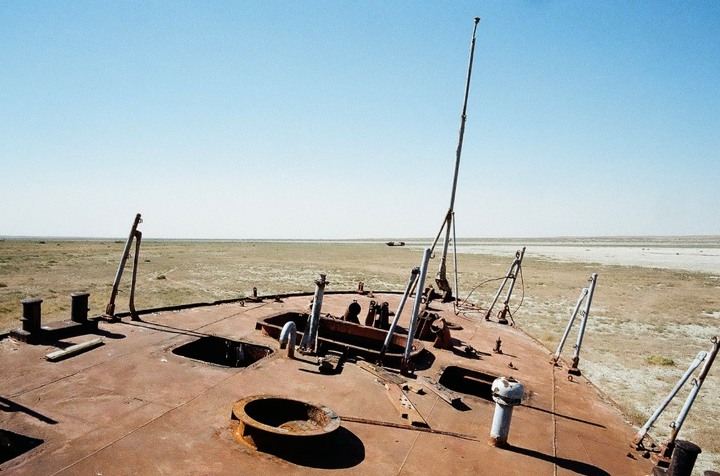
F: What would you advise Kazakh directors to enter the world market?
"You need to learn how to get to the "right" sale agents early at the production stage, so that you don't have to do the job unusual for a director. The director's task is to make a high–quality project, everything else is the work of a sale agent. Not even a producer, he has other tasks.
Of course, in addition to finding a competent agent, you have to speak English. After all, we have to present our projects at international venues, we have to defend our films. Negotiations are conducted in English.
Well, you need to understand the procedure of film industry – first is the movie production, then its presentation at film festivals, release, broadcasting on TV channels, and the logical conclusion is a streaming platform.
Katerina Suvorova is a Kazakhstani director and media artist. She was born in Almaty, and graduated from the local art school. She took Higher Courses of Screenwriters and Directors in Moscow, where she studied live-action cinema. She studied at the Werner Herzog's Rogue Film School.
Suvorova's filmography includes about a dozen full-length and short films, many of them have been awarded prizes at international film festivals. Thus, the short film Two Bicycles won the Guild of Film Critics of Russia Award and the Young European Award 2009. The film Extra Fortress received the Saint Anna Russian National Award, the film Zh received a special Robert Bosch prize at the Kinoshok Film Festival, Medianstan received the prize for the best documentary at the Gothenburg Independent Film Festival.
Katerina not only makes films, but also writes scripts for them, and in some of them she plays the main roles.
Forbes KZ